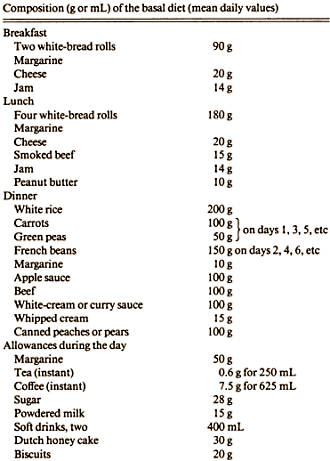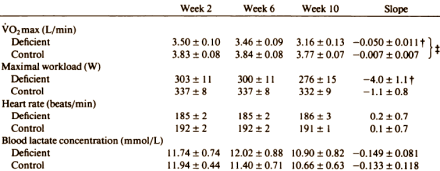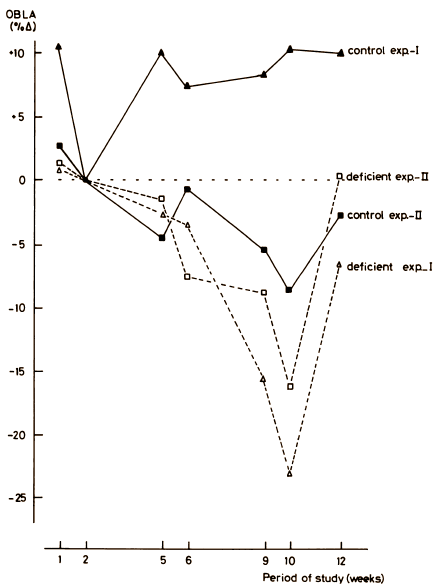Multivitamins: not such a crazy idea
Thousands of athletes take multivitamin supplements daily. That way they know for sure that they've had all the vitamins and minerals they need. According to a Dutch study done in 1988 they have a point: a diet that's short on vitamin B1, B2, B6 and C can lower performance capacity within a few weeks.
Multivitamins
Of course athletes know it's better to get your minerals and vitamins from your regular diet than from a pill. But what if your diet happens to contain too few vitamins? What if, without knowing, you're not getting enough of a particular vitamin? In situations like these a cheap supplement can work as a kind of a nutritional insurance policy.
[FONT="]
[/FONT]

[FONT="]
[/FONT]
The researchers believe that this phenomenon is partly due to insufficient vitamin C intake. In developed countries vitamin C intake is alarmingly low – so low that doctors are starting to encounter cases of scurvy. A more modest vitamin C deficiency can also result in a decrease in L-carnitine production. Cells need L-carnitine to burn fatty acids.Study
In 1988 researchers at TNO in the Netherlands published the results of an experiment in which they deliberately let 12 healthy male students develop a deficiency in vitamins B1, B2, B6 and C. They did it by following the diet shown below. Many people's diet is pretty much the same as this, or even more unhealthy.
[FONT="]
[/FONT]
 [FONT="]
[FONT="]
[/FONT]
The researchers also gave their subjects a supplement to make up for the deficiencies, except for the vitamin B1, B2, B6 and C deficiencies.A control group of 11 students got the same diet, plus a supplement that did make up for all the vitamins they were lacking.
The researchers measured the students' performance capacity during the two weeks before depletion began, during the depletion period – from week 2 to week 10 – and during the recovery period, when the vitamin intake was normalised. The researchers got the students to do a bicycle exertion test during which the intensity was gradually increased.
Results
The table below shows that the maximal oxygen uptake [VO2max] decreased by almost ten percent. In some of the subjects this negative effect was considerably higher, according to the researchers.
"Despite a mean decrease in aerobic power of 9.8 percent that was observed during the period of low vitamin intake, the individual responses in deficient subjects varied from -25.3 to +3.1 percent", they write.
[FONT="]
[/FONT]


[FONT="]
[/FONT]
The effect on acidification was also high. The point at which the lactic acid level in the blood [OBLA] rose as a result of increasingly intensive exertion went down in the experimental group. Once again, the response varied considerably among the test subjects.
"Although a mean decrease in OBLA of 19.6 percent was observed during the period of low vitamin intake, the individual responses in the deficient subjects varied from -38.7 to +11.6 percent", the researchers write.
Source:
Am J Clin Nutr. 1988 Dec;48(6):1451-62.
Thousands of athletes take multivitamin supplements daily. That way they know for sure that they've had all the vitamins and minerals they need. According to a Dutch study done in 1988 they have a point: a diet that's short on vitamin B1, B2, B6 and C can lower performance capacity within a few weeks.
Multivitamins
Of course athletes know it's better to get your minerals and vitamins from your regular diet than from a pill. But what if your diet happens to contain too few vitamins? What if, without knowing, you're not getting enough of a particular vitamin? In situations like these a cheap supplement can work as a kind of a nutritional insurance policy.
[FONT="]
[/FONT]

[FONT="]
[/FONT]

|
In 1988 researchers at TNO in the Netherlands published the results of an experiment in which they deliberately let 12 healthy male students develop a deficiency in vitamins B1, B2, B6 and C. They did it by following the diet shown below. Many people's diet is pretty much the same as this, or even more unhealthy.
[FONT="]
[/FONT]

[/FONT]

|
The researchers measured the students' performance capacity during the two weeks before depletion began, during the depletion period – from week 2 to week 10 – and during the recovery period, when the vitamin intake was normalised. The researchers got the students to do a bicycle exertion test during which the intensity was gradually increased.
Results
The table below shows that the maximal oxygen uptake [VO2max] decreased by almost ten percent. In some of the subjects this negative effect was considerably higher, according to the researchers.
"Despite a mean decrease in aerobic power of 9.8 percent that was observed during the period of low vitamin intake, the individual responses in deficient subjects varied from -25.3 to +3.1 percent", they write.
[FONT="]
[/FONT]


[FONT="]
[/FONT]
The effect on acidification was also high. The point at which the lactic acid level in the blood [OBLA] rose as a result of increasingly intensive exertion went down in the experimental group. Once again, the response varied considerably among the test subjects.
"Although a mean decrease in OBLA of 19.6 percent was observed during the period of low vitamin intake, the individual responses in the deficient subjects varied from -38.7 to +11.6 percent", the researchers write.
Source:
Am J Clin Nutr. 1988 Dec;48(6):1451-62.
